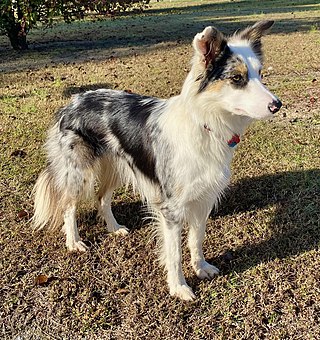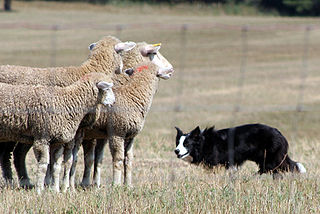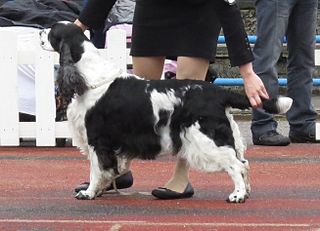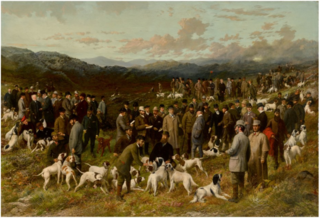Dog trial may refer to:

Guide dogs are assistance dogs trained to lead blind or visually impaired people around obstacles. Although dogs can be trained to navigate various obstacles, they are red–green colour blind and incapable of interpreting street signs. The human does the directing, based on skills acquired through previous mobility training. The handler might be likened to an aircraft's navigator, who must know how to get from one place to another, and the dog is the pilot, who gets them there safely. In several countries guide dogs, along with most other service and hearing dogs, are exempt from regulations against the presence of animals in places such as restaurants and public transportation.

The Border Collie is a breed of herding dog of medium size. Widely considered to be the most intelligent dog breed, they are descendants of landrace sheepdogs that were once found all over the British Isles, but became standardised in the Anglo-Scottish border region. They are now mostly used as working dogs to herd livestock, specifically sheep.

Schutzhund, currently known competitively as IGP and previously as IPO, is a dog sport that tests a dog's tracking, obedience, and protection skills, and evaluates if a dog has the appropriate traits and characteristics of a good working dog. It was developed in Germany in the early 1900s as a suitability test for German Shepherds, but soon became the model for training and evaluating all five of the German protection breeds, which included Boxer, Dobermann, Riesenschnauzer, and Rottweiler. Though any breed of dog can participate, today the sport is dominated by German Shepherds and the Belgian Malinois breed. Dog owners and handlers participate in Schutzhund clubs as a group activity for training the dogs, and clubs sponsor trials to test the dogs and award titles. The best dogs can qualify to participate in national and international level championships.

A sheepdog trial — is a competition or test for working abilities of herding breeds dogs. It is a type of dog sport that emerged in the 1860s in New Zealand. By the 1870s regular trials were also being held in Australia and the United Kingdom, and by the end of the 20th century gained popularity in many countries of the world. In competition, dogs demonstrate basic herding management skills assessed by the judge. International and national cynological and sports organisations, sheep and cattle breeders' societies are involved in organising these events. Usually competitions are held with sheep, sometimes other animals are used: ducks or cows.

In general, an assistance dog, known as a service dog in the United States, is a dog trained to aid or assist an individual with a disability. Many are trained by an assistance dog organization, or by their handler, often with the help of a professional trainer.

A retriever is a type of gun dog that retrieves game for a hunter. Generally gun dogs are divided into three major classifications: retrievers, flushing spaniels, and pointing breeds. Retrievers were bred primarily to retrieve birds or other prey and return them to the hunter without damage; retrievers are distinguished in that nonslip retrieval is their primary function. As a result, retriever breeds are bred for soft mouths and a great willingness to please, learn, and obey. A soft mouth refers to the willingness of the dog to carry game in its mouth without biting into it. "Hard mouth" is a serious fault in a hunting dog and is very difficult to correct. A hard-mouthed dog renders game unpresentable or at worst inedible.

The English Springer is a breed of gun dog in the Spaniel group traditionally used for flushing and retrieving game. It is an affectionate, excitable breed with a typical lifespan of twelve to fourteen years. They are very similar to the Welsh Springer Spaniel and are descended from the Norfolk or Shropshire Spaniels of the mid-19th century; the breed has diverged into separate show and working lines. The breed suffers from average health complaints. The show-bred version of the breed has been linked to "Rage syndrome", although the disorder is very rare. It is closely related to the Welsh Springer Spaniel and very closely to the English Cocker Spaniel; less than a century ago, springers and cockers would come from the same litter. The smaller "cockers" hunted woodcock while the larger littermates were used to flush, or "spring", game. In 1902, The Kennel Club recognized the English Springer Spaniel as a distinct breed. They are used as sniffer dogs on a widespread basis. The term Springer comes from the historic hunting role, where the dog would flush (spring) birds into the air.

A herding dog, also known as a stock dog, shepherd dog, sheep dog or working dog, is a type of dog that either has been trained in herding or belongs to breeds that are developed for herding.

Gun dogs, or bird dogs, are types of hunting dogs developed to assist hunters in finding and retrieving game. The term hunting dog is broad and includes all breeds and skills of hunting canines, but "gun dogs" refers to canines that are trained to work alongside a loud firearm while hunting or retrieving game. Gun dogs are divided into three main categories: pointers and retrievers, setters and spaniels, and water dogs.

A police dog is a dog that is trained to assist police and other law enforcement officers, search and rescue, or the military. Their duties may include searching for drugs and explosives, locating missing people, finding crime scene evidence, protecting officers and other people, and attacking suspects who flee from officers. The breeds most commonly used by law enforcement are the German Shepherd, Belgian Malinois, Bloodhound, Dutch Shepherd, and Labrador Retriever. In recent years, the Belgian Malinois has become the leading choice for police and military work due to their intense drive, focus, agility, and smaller size, though German Shepherds remain the breed most associated with law enforcement.

The United Kennel Club (UKC) is a kennel club founded in 1898 in the United States. In contrast with the American Kennel Club, which is non-profit and which only clubs can join, the United Kennel Club is a profit-making corporation, open to individuals.
A show dog might refer to any dog entered into a dog show. More specifically, a show dog is a dog which has been specially bred, trained, and/or groomed to conform to the specifications of dog shows, so as to have a chance of winning. Often used as a single word (showdog), the term is also used within the sport of conformation to refer to a dog that displays a particularly energetic or outgoing character.

Tracking refers to a dog's ability to detect, recognize and follow a specific scent. Possessing heightened olfactory abilities, dogs, especially scent hounds, are able to detect, track and locate the source of certain odours. A deeper understanding of the physiological mechanisms and the phases involved in canine scent tracking has allowed humans to utilize this animal behaviour in a variety of professions. Through domestication and the human application of dog behaviour, different methods and influential factors on tracking ability have been discovered. While tracking was once considered a predatory technique of dogs in the wild, it has now become widely used by humans.

An earthdog test or earthdog trial tests the working ability and instinct of the small, often short-legged terriers or Dachshunds. These dogs were bred to hunt vermin and other quarry which lived in underground dens. Earthdog den tests involve man-made tunnels that the dogs must navigate, while scenting a rat, "the quarry". The dog must follow the scent to the quarry and then "work" the quarry. Depending on the sanctioning organization, "working" means barking, scratching, staring, pawing, digging; any active behavior. The quarry is protected at all times by wooden bars across the end of the tunnel. The hunting encounter is controlled, and neither the dog nor the quarry are endangered by the activity.
An obedience trial is a dog sport in which a dog must perfectly execute a predefined set of tasks when directed to do so by his handler. According to the American Kennel Club (AKC) obedience regulations
The basic objective of obedience trials, however, is to recognize dogs that have been trained to behave in the home, in public places, and in the presence of other dogs, in a manner that will reflect credit on the sport of obedience at all times and under all conditions.

A field trial is a competitive event for gundogs. Field trials are conducted for pointing dogs and setters, retrievers and spaniels, with each assessing the different types various working traits. In the United States, field trials are also conducted for Basset Hounds, Beagles and Dachshunds.
A psychiatric assistance dog or psychiatric service dog is a sub-category of assistance dog trained to assist their handler with a psychiatric disability or a mental disability, such as obsessive-compulsive disorder, post-traumatic stress disorder, schizophrenia, depression, anxiety, and bipolar disorder.
Dog handlers can refer to:

Dog agility is a dog sport in which a handler directs a dog through an obstacle course in a race for both time and accuracy. Dogs run off leash with no food or toys as incentives, and the handler can touch neither dog nor obstacles. The handler's controls are limited to voice, movement, and various body signals, requiring exceptional training of the animal and coordination of the handler.
Dogman or Dog Man may refer to: